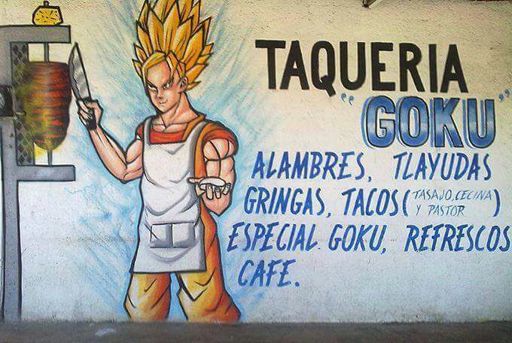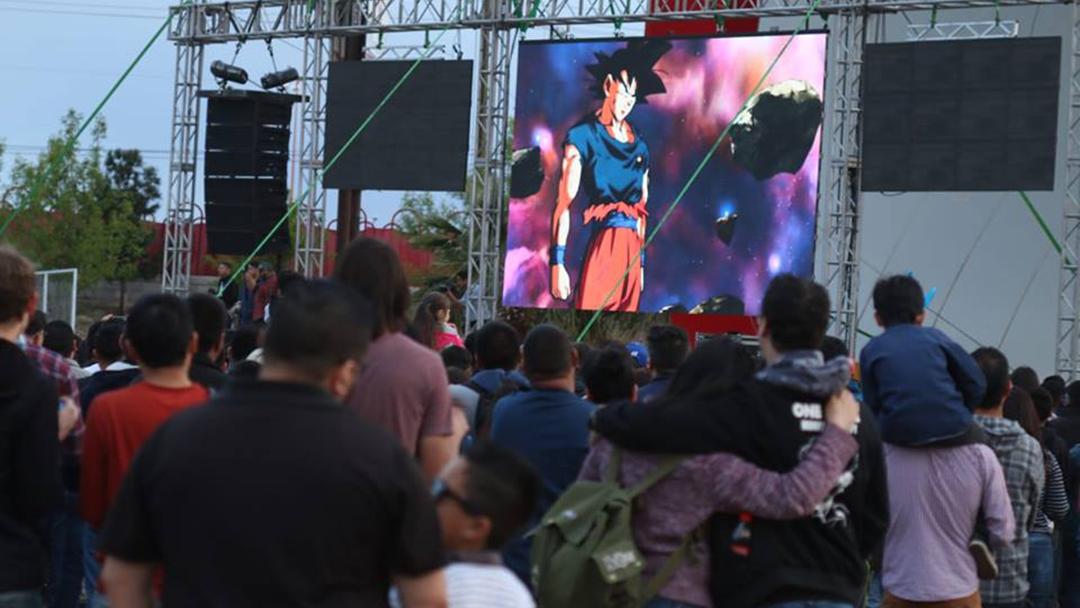Dragon Ball is a series that has won fans worldwide with its unique combination of epic storytelling, memorable characters, thrilling battles, universal themes, and constant evolution. Specifically, in Mexico, the animation had a significant impact due to two main reasons: its accessibility and the values it promotes, which align closely with Mexican culture.
Penetration into the Audience
In Mexico, Dragon Ball reached a large part of the population because it was broadcast on Canal 5, a free-to-air public television channel, at a time when there were few entertainment options for children and teens on TV.
At that time, cable TV channels existed but were expensive, and few Mexicans could afford them. TV signals were divided into public and commercial channels focused on culture, art, news, sports, variety shows, and the most popular genre, telenovelas, with limited programming for children.
Dragon Ball first aired in Mexico in 1993 under the name “Zero y el Dragón Mágico” on Canal 5. This version, dubbed by the American company Harmony Gold, featured changes in character names, music, and some plot elements. Due to low promotion and an adaptation that didn’t capture the original essence, it wasn’t very successful.
In 1994, Bandai commissioned a new dub from the Mexican company Producciones Salgado, which had worked on “Los Caballeros del Zodiaco.” This more faithful version, titled simply “Dragon Ball,” premiered on September 2, 1997, on Canal 5, marking the start of a golden era for anime in Mexico.
Although Dragon Ball Z became the most popular series in Mexico, the arrival of “Zero y el Dragón Mágico” in 1993 was a significant milestone, opening the door for anime on Mexican television and laying the foundation for the success of Dragon Ball and other series in the genre in subsequent years.
Values Promoted by Dragon Ball and Their Similarities with Mexican Culture
Dragon Ball, throughout its extensive history, has conveyed a series of values that have resonated with fans of all ages. These values are not only fundamental to the development of the characters and the plot but also offer significant life lessons. The most prominent values in Dragon Ball include:
- Friendship: Friendship is a fundamental pillar of Dragon Ball. Throughout the series, Goku and his companions face challenges together, share joys and sorrows, and support each other in difficult times. The series highlights the importance of loyalty, trust, camaraderie, and sacrifice for friends.
- Perseverance: Goku exemplifies perseverance. Despite facing difficulties and obstacles, he never gives up and always seeks to improve himself. The series teaches that with effort, dedication, and an unbreakable spirit, we can achieve our goals.
- Teamwork: Dragon Ball shows that teamwork is essential for achieving great objectives. Goku and his friends learn that together they can overcome any challenge by combining their strengths and supporting each other. The series emphasizes the importance of collaboration, communication, and respect for others’ abilities and opinions.
- Personal Growth: Throughout the series, Dragon Ball characters experience significant personal growth. Goku, for example, learns to control his power, master new techniques, and discover his true potential. The series motivates us to step out of our comfort zone, face our fears, and strive to be the best version of ourselves.
- Justice: Dragon Ball promotes justice and the fight for what is right. Goku and his friends are always willing to defend the innocent and fight against evil. The series teaches the importance of upholding our values, acting with integrity, and fighting for a better world.
- Family Importance: Despite not having a traditional family, Goku finds a father figure in Master Roshi and an adoptive family with Bulma, Krillin, and Gohan. The series reminds us of the importance of family bonds, love, and mutual support.
- Respect for Life: Despite being an action series with epic battles, Dragon Ball also conveys a message of respect for life. Goku always seeks to avoid unnecessary death and gives his enemies a chance for redemption. The series teaches us to value human life and seek peaceful solutions to conflicts.
- Power Control: Dragon Ball teaches that power, both physical and emotional, must be used responsibly and with a noble purpose. Goku learns to control his strength and use it to protect others, not to cause harm. The series motivates us to be aware of our abilities and use them for good.
- Optimism and Hope: Despite facing difficult situations and powerful enemies, Goku always maintains an optimistic and hopeful attitude. The series teaches us not to lose faith in ourselves, to maintain a positive attitude in adversity, and to believe in the possibility of a better future.
- Fun and Adventure: Dragon Ball reminds us of the importance of fun, adventure, and enjoying life. Goku and his friends live great adventures, face exciting challenges, and experience moments of joy and camaraderie. The series motivates us to break the routine, explore new experiences, and enjoy life to the fullest.
While the values promoted by Dragon Ball are appreciated in many cultures, some of the deeply rooted values in Mexican culture that match those of the animated series include:
- Family: Family is the cornerstone of Mexican society. It is considered a space of love, support, protection, and teaching. Family values like unity, respect for elders, responsibility, and solidarity are essential to Mexican identity.
- Community: Community is another fundamental value in Mexican culture. It fosters a sense of belonging, mutual collaboration, and support among community members. Collective organization to achieve common goals and the celebration of community events are expressions of this value.
- Respect: Respect for elders, authorities, traditions, and different opinions is a fundamental value in Mexican culture. Education in respect is encouraged from childhood, instilling values such as courtesy, tolerance, and empathy.
- Joy: The joy of living is a characteristic trait of the Mexican people. Life is celebrated with music, dance, colorful and enthusiastic festivities and traditions. Joy is expressed in the willingness to enjoy simple moments and share with others.
- Resilience: The Mexican people have shown great resilience throughout their history. Faced with adversity, Mexicans have united, supported each other, and found the strength to move forward. Resilience is reflected in the ability to overcome challenges, adapt to changes, and build a better future.
- Strength: Physical and mental strength is an important value in Mexican culture. Discipline, hard work, perseverance, and the ability to face challenges are encouraged. Strength is reflected in the struggle to achieve dreams, overcome obstacles, and build a better life.
Curiosities about Dragon Ball in Mexico
Do crime rates in Mexico decrease when a new episode of Dragon Ball is released?
The idea that crime rates in Mexico drop when a new Dragon Ball episode airs is an inaccurate claim popularized as a meme or a baseless belief. Although this idea is reproduced humorously, there is no scientific evidence to support it.
Did the government broadcast Dragon Ball Super in public squares in Mexico?
The broadcasts of Dragon Ball Super in Mexican plazas in 2022 were special events for anime fans. Although they couldn’t be held officially due to lack of permission from Toei Animation, several municipalities and local organizations took the initiative to bring this epic episode to the masses.
Where did the broadcasts occur?
The broadcasts were organized in public squares in various cities, including:
- Pachuca, Hidalgo: Plaza Independencia.
- Ciudad Juárez, Chihuahua: Plaza Benito Juárez.
- Tampico, Tamaulipas: Plaza de Armas.
- Ciudad Madero, Tamaulipas: Explanada de la Presidencia Municipal.
- Culiacán, Sinaloa: Plazuela Obregón.
- San Luis Potosí: Plaza de Armas.
How was it experienced?
The broadcasts created a festive atmosphere filled with fans of all ages. Attendees enjoyed the episode on giant screens, accompanied by music, food, and activities related to the series.
Were there any issues?
While the initiative was praised by many, it also sparked controversy due to the lack of official permissions for the broadcast. Toei Animation, the owner of the rights to Dragon Ball Super, did not endorse these screenings and issued a statement disassociating itself from any responsibility.
Goku for President, as a Business Emblem, etc.

Dragon Ball has had such an impact in Mexico that it is not uncommon to see walls, facades, and business names inspired by the series. In 2024, a candidate for senator in Nuevo León, Mexico, used Goku’s image in his campaign to win the youth vote. Meanwhile, in 2018, a group of Dragon Ball fans in Mexico organized a social media campaign for Goku to be a presidential candidate.
Dragon Ball Dubbing in Mexico
Mexicans’ love for Dragon Ball extends to the dubbing team of the series, making it common for voice actors to appear at major anime expos in the country. Many fans know the names and careers of the voice actors by heart. Among the most recognized cast members are:
- Goku: Mario Castañeda (original and current voice)
- Gohan: Luis Alfonso Mendoza (first voice) / Cristóbal Castañeda (current voice)
- Goten: Arturo Castañeda
- Vegeta: Carlos del Campo (first voice) / Eduardo Garza (current voice)
- Krillin: Eduardo Garza (first voice) / Ismael “El Dandy” Estrada (current voice)
- Trunks: Eduardo Garza (first voice) / Mario Castañeda (current voice)
- Piccolo: Carlos del Campo (first voice) / Jesús Guzmán (current voice)
- Master Roshi: Alfonso Obregón (first voice) / Ismael “El Dandy” Estrada (current voice)
- Bulma: Rossana Zembri
- Freezer: Javier “Chío” García
- Cell: Arturo Castañeda
- Majin Buu: José Luis Castañeda
Dragon Ball Continues to Air in Mexico
Yes! Fortunately, Dragon Ball continues to be present on Mexican free-to-air television. As of May 1, 2023, both Dragon Ball Z and Dragon Ball Super are broadcast on Azteca 7. While Dragon Ball is no longer broadcast on Televisa, as it was for many years, it remains a beloved anime in Mexico, and its presence on free-to-air television ensures that new generations can enjoy the adventures of Goku and his friends. Additionally, Dragon Ball is available on various streaming platforms, such as Crunchyroll and HBO Max.
Other Japanese Animations Impacting Mexico
The first anime to arrive in Mexico was Astroboy, also known as Astro Boy: The Robot Boy or Astroboy: The Little Robot. The series premiered in 1964 on Canal 5 (then XHGC), owned by engineer Guillermo González Camarena.
Astroboy, created by mangaka Osamu Tezuka, is considered a pioneer of anime and has had a significant impact on Japanese and international popular culture. The series tells the story of Astro, a robot boy who fights to protect humanity and find his place in the world.
The arrival of Astroboy in Mexico marked the beginning of a long love story with anime in the country. Over the years, thousands of anime series and movies have been broadcast on Mexican television, captivating audiences of all ages. Some of the most popular animes in Mexico include Dragon Ball, Sailor Moon, Los Caballeros del Zodiaco, Slam Dunk, Naruto, and One Piece. Anime has profoundly impacted Mexican culture, inspiring artists, musicians, writers, and filmmakers. It has also strengthened the ties between Mexico and Japan, two countries with rich cultures and a great passion for animation.

